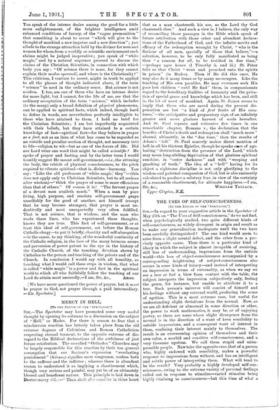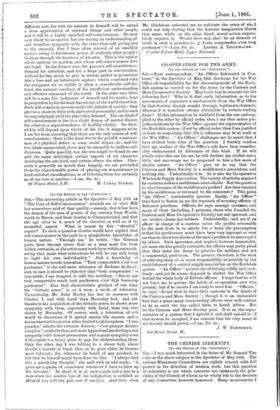THE USES OF SELF-CONSCIOUSNESS.
[To THE EDITOR OF THE "SPECTATOR."] • SIR,—In regard to your suggestive article in the Spectator of May 25th on "The Uses of Self-consciousness," do we not find, when psychologically studied, two quite different kinds of self-consciousness, so widely divergent in origin and result as to make any generalisation inadequate until the two have been carefully distinguished ? The one kind would seem to arise from a slight mental defect, and the other from a pre- cisely opposite cause. Thus there is a particular kind of idiocy in which the subject is almost incapable of receiving, still less of understanding, impressions from the Outside world—this loss of object-consciousness accompanied by * corresponding heightening of subject-consciousness also occurs in some kinds of lunacy—and instead of interpreting an impression in terms of externality, as when we say we see a tree or feel a blow from contact with the table, the subject interprets the impression subjectively only, feelink the green, for instance, but unable to attribute it to a tree. Such person's universe will consist of himself and his feelings without any external world, producing the acme of egotism. This is a most extreme case, but useful for understanding slight deviations from the normal. Now, as we are all deficient or abnormal in some direction or other, the power to work mathematics, it may be, or of enjoying poetry, so there are some whose slight divergence from the normal is in the direction of a want of keen sensibility to outside impressions, and a consequent want of interest in them, confining their interest mainly to themselves. The result is an overweening opinion of themselves and their own value, a morbid and sensitive self-consciousness, and a very tiresome egotism. We call them stupid and" unim- pressible people. Now take the opposite case, that of sc person who, highly endowed with sensibility, makes a powerful response to impressions from without, and has an intelligent and subtle power of interpreting them. What will tend to be the result? 'Very probably a highly developed' self ;con- sciousness, owing to the extreme variety of personal feelings called out in response to stimulus—varied stimulus being highly vitalising to consciousness—but this time of wbal a different sort, for with the interest in himself will be united a keen appreciation of outward things and other people, and it will be a highly enriched self-consciousness. He may very likely be an egotist, but one having an understanding of. and therefore sympathy with, the other-than-self, giving rise to the anomaly, that I have often noticed, of an unselfish egotist, owing to his intense power of realising other people's feelings through the keenness of his own. This is the egotist whose egotism we pardon, and whose self-consciousness does not repel. In the former case, the person's self-assertiveness, demand for attention, and for a large part in conversation, without having much to give in return, makes us pronounce him a bore and an intolerable egotist; whilst combined with the arrogance we so dislike is often a considerable self-dis- trust, the natural corollary of his insufficient understanding and effective command of the world. In the other case there will be a sane, fair judgment of himself and his merits, kept in proportion by his intimate knowledge of the world abouthira. Such self-conscious persons make the delight of society ; they give us a share in their rich and varied personality, and to such we ungrudgingly yield the place they demand. The one kind of self-consciousness is due to a slight degree of mental disease, the other to a superabundance of healthy vitality. Its desir- ability will depend upon which of the two it happens to be. I am far from asserting that these are the only causes of self- consciousness ; there is the kind due to the painful conscious- ness of a physical defect or some social stigma, &c., and the two kinds enumerated above may be amenable to endless sub- divisions. Quite possibly, too, the two might be found in one and the same individual, certain aspects of his character developing the one kind, and certain others the other. Char- acter is generally BO mixed that, happily, we are precluded from the objectionable power of placing our acquaintance in hard-and-fast classifications, or of ticketing them too certainly as of one sort or another.—I am, Sir, &c.,







































 Previous page
Previous page